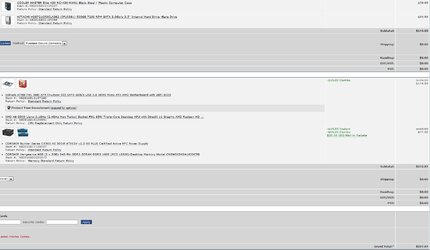Buying A "Barebones" PC
As found here: By Charles M. Kozierok
http://www.pcguide.com/buy/req/buyingBarebones-c.html
An option that is even less commonly considered than building a PC, is buying what is called a "barebones" PC. This is sort of a "half-built" PC, with some basic components included and already installed. Barebones PCs are also sometimes called "base systems" (which is actually a more pleasant name, if less commonly used. :^) )
The contents of a barebones PC varies greatly from package to package. Typically, every barebones system includes at least a case, power supply, and motherboard. Some systems add to this some combination of a floppy disk drive, video card, CD-ROM drive, mouse, keyboard, sound card, and speakers. A processor, system memory and hard disk drive are typically
not included. As you can see, the exact contents can range from just the beginnings of a system to most of a complete machine, so you
must ask specifically what is included in any "barebones" systems you may be considering.
As you can see, a "barebones" PC is a compromise between a fully-assembled PC and a PC you build yourself. As with most compromises, whether the glass is half-empty or half-full is largely a matter of your perspective:
- Advantages of Barebones PCs: You can save considerable time and hassle you would otherwise spend buying "routine" components and then putting them together, compared with buying every individual component. You still get to choose whichever "power components" (CPU, memory, video and hard disk) you want, and these are easy to add to a system that is basically assembled.
- Disadvantages of Barebones PCs: Since the companies are selling a packaged unit at a single price, and their target market is usually people trying to save money, they have a strong incentive to use the cheapest components possible. This usually means a no-name motherboard and el-cheapo power supply. Any components like CD-ROM drives or video cards are also usually rather low-end. Since the motherboard and power supply are always included in these systems, and these are critical components for ensuring a high quality system, you are usually sacrificing the quality of your system, and may be better off just buying a pre-made system.
I personally am in the second camp; these systems have never appealed to me very much because they usually come with junky components in important areas, and few real advantages. They are saving you a few minutes of your time, but at a fairly high price. If you don't want to put the motherboard into the case, etc., then you should go back to looking at a pre-built system, which at least comes with other advantages such as bundled software and a full warranty.
So barebones units don't seem to have much to recommend them to me, unless you find one that uses good quality components. If you're going to get one, then look for one where the company hasn't sacrificed all just to get the price down. Find out exactly what the included components are. And don't buy a system with a lot of "optional" components included unless they are both good quality
and components you need.
Warning: Some companies selling these systems are very up-front about their contents; others play cute little games. A typical ploy is to provide a long list of "features", which is really just a laundry list of every piece of hardware the motherboard supports. They are trying to make it look like a lot is included in the package, because it sells better; in reality the "supported hardware" is common to almost every motherboard. Strip all of that away to see what actual parts come in the box.
Charles M. Kozierok

 .
.
